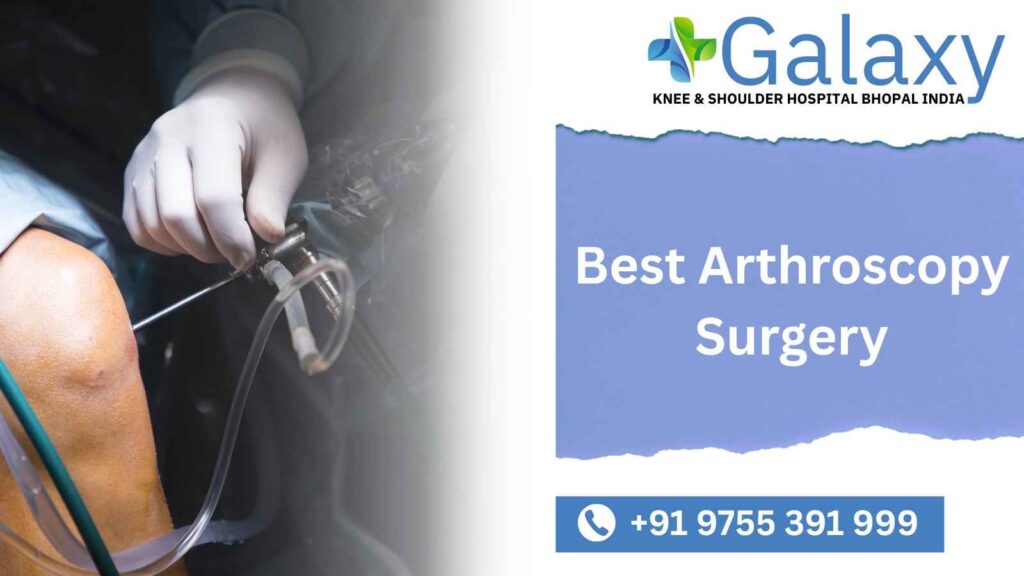Best Arthroscopy Surgery in Bhopal ☎ +91-9755391999

Introduction to Arthroscopy Surgery Arthroscopy surgery has completely revolutionized the way joint injuries are diagnosed and treated. If you’re dealing with persistent knee or shoulder pain, there’s a good chance that arthroscopy could be your ticket to relief. This minimally invasive procedure is gaining popularity not just in big metro cities but also in fast-growing healthcare hubs like Bhopal. So, what exactly is arthroscopy? Imagine a tiny camera entering your joint through a small incision. It gives the surgeon a crystal-clear view of what’s going on inside without the need for large cuts. That’s what makes this procedure so special—it’s less painful, leaves minimal scars, and offers a quicker recovery. In Bhopal, the face of modern arthroscopy is Dr. S.K. Gupta, who brings decades of international training and thousands of successful surgeries under his belt. At Galaxy Hospital, the facilities match world-class standards, making it the go-to place for Arthroscopy Surgery in Bhopal. Dr. S.K. Gupta’s Unparalleled Expertise When you’re trusting someone to fix your joints, experience matters. And Dr. S.K. Gupta brings more than 21 years of it. He’s not just a local name—his work resonates on national and international platforms. He’s a fellow in Arthroscopy and Sports Medicine from Japan, trained in elite medical institutions in Germany, UK, Singapore, and Thailand. Dr. Gupta has independently performed more than 9000 knee and 3000 shoulder surgeries. He’s a favorite not just among everyday patients but among elite athletes from disciplines like Hockey, Judo, Boxing, and Taekwondo. His ability to get sports stars back in the game is legendary. He’s also served as a visiting sports medicine specialist for the Sports Authority of India and held faculty roles in prestigious workshops. Awards? He has over 250 national and international honors to his name, making him a beacon of excellence in arthroscopy surgery. Galaxy Hospital – A Center of Excellence If you’re looking for top-notch facilities for Arthroscopy Surgery in Bhopal, Galaxy Hospital stands tall among the rest. It isn’t just a hospital; it’s a center where world-class expertise meets cutting-edge medical infrastructure. Located in the heart of Bhopal, Galaxy Hospital has transformed the orthopedic and sports injury treatment landscape in the region. What sets this hospital apart is its patient-first approach. From the moment you walk in, you’re greeted with organized, hygienic surroundings and a staff that truly cares. The entire surgical wing is equipped with advanced arthroscopic tools, high-definition visualization systems, and sterile operating environments that rival top international hospitals. But it’s not just about the equipment. Galaxy Hospital is deeply committed to post-operative recovery and rehabilitation. There’s a fully integrated physiotherapy unit where patients are guided through personalized recovery programs. Every single patient is followed up regularly to ensure optimal healing and functionality. Moreover, the hospital’s support staff—including anesthesiologists, surgical nurses, and physiotherapists—are trained to handle complex orthopedic cases. Their collective experience plays a pivotal role in the hospital’s near-perfect surgical outcomes. Galaxy Hospital is not just a place to get treatment; it’s a place to heal completely. Why Choose Arthroscopy for Knee and Shoulder Let’s get into why arthroscopy is such a game-changer—especially for joint issues related to the knee and shoulder. Traditional open surgeries used to mean large incisions, longer hospital stays, and prolonged recovery periods. With arthroscopy, those days are gone. This minimally invasive procedure involves tiny incisions through which an arthroscope (a small camera) and specialized surgical tools are inserted. It allows the surgeon to diagnose and treat the issue in real-time. This approach ensures less damage to surrounding tissues, minimal blood loss, and faster recovery. Common Conditions Treated with Arthroscopy: ACL and PCL tears in the knee Meniscus injuries Rotator cuff tears Shoulder impingement Labral tears Joint instability Cartilage degeneration These conditions often arise in athletes, gym-goers, and older adults dealing with wear-and-tear arthritis. Whether it’s a ligament issue or a tendon tear, arthroscopy can restore function and reduce pain significantly. And when performed by a skilled hand like Dr. S.K. Gupta’s, the results can be life-changing. One of the biggest benefits? Most arthroscopy procedures are done as outpatient surgeries. You walk in the same day, and in a few hours, you’re heading home with a treatment plan. That’s efficiency and comfort rolled into one. Types of Arthroscopic Procedures Offered At Galaxy Hospital, the spectrum of arthroscopic procedures offered is both comprehensive and customized. Dr. S.K. Gupta’s surgical mastery extends across various types of joint injuries and complexities. Knee Arthroscopy This is one of the most common procedures and includes: ACL & PCL Reconstruction – Repairs torn ligaments essential for knee stability. Meniscus Repair or Meniscectomy – Treats cartilage tears that often cause locking or catching in the knee. MPFL Reconstruction – For patients with frequent kneecap dislocations. High Tibial Osteotomy (HTO) – Realignment for early arthritis management. Cartilage Preservation Surgeries – Prevent early joint degeneration. Shoulder Arthroscopy Equally specialized care is provided for the shoulder with procedures like: Rotator Cuff Repair – For torn shoulder muscles. Shoulder Impingement Surgery – Relieves pinching and pain. Frozen Shoulder Release – Enhances mobility and reduces pain. SLAP and Labral Repairs – For athletes facing instability. Biceps Tenodesis – Treats long head of biceps tendon issues. Shoulder Replacement and Latarjet Procedure – For more complex reconstructions. Sports Injury Treatments This includes treatment plans tailored to high-performance athletes: ACL/PCL/MCL injuries in sports Shoulder dislocations during contact sports Chronic tendonitis and ligament sprains Multi-ligament reconstructions Every surgery is mapped out with a comprehensive pre-op and post-op care plan. The surgical process is just one part—complete recovery involves personalized physiotherapy and gradual return-to-play protocols. Post-Surgery Rehabilitation and Recovery Plans One of the cornerstones of successful Arthroscopy Surgery in Bhopal is what happens after the procedure—rehabilitation. At Galaxy Hospital, post-surgery recovery isn’t treated as an afterthought but as an integral part of the healing process. Dr. S.K. Gupta and his expert rehabilitation team understand that surgery alone won’t deliver complete results without a structured recovery roadmap. Right after surgery, patients receive a personalized post-operative care plan. This includes immediate pain

